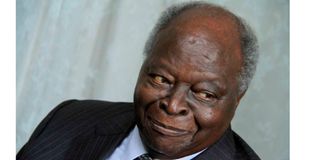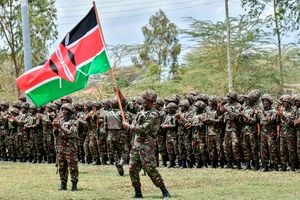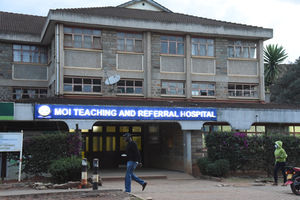Beneath veneer of pushover was a brave fighter, say Kibaki associates

The third President of the Republic of Kenya, the late Mwai Kibaki.
What you need to know:
- Allies say Kibaki would strike with devastating effect whenever situation demanded.
- In 1988, Mwai Kibaki, then Othaya MP protested bitterly at an attempt to rig him out.
Throughout his political career, former President Emilio Mwai Kibaki, who died on April 21, has been perceived as the gentleman of Kenyan politics and a reserved man, who carefully weighed his words before uttering them.
Those who were close to him say he took everything in his stride and no amount of provocation would make him lose his cool. Perhaps taking advantage of his composed demeanour, in the 1980s, a coterie of Kibaki’s detractors laid a political siege on him, reportedly hoping to oust him as the Nyeri Kanu branch chairman and subsequently having him kicked out of the vice-president seat.
The plot had reportedly been hatched by a cabal of Nyeri politicians at the behest of the top brass of the President Daniel Moi’s government, which was becoming increasingly autocratic.
The Kanu loyalists plotting Kibaki’s political downfall included then powerful Cabinet minister and Mathira MP Davidson Ngibuini Kuguru, then Mukurwe-ini MP Ngumbu Njururi and Nahashon Kanyi, who was once a minister of State in the Office of the President and Tetu MP.
Mr Kibaki had on his side the likes of former Kieni MP Munene Kairu.
The loyalists never missed a chance to harangue Kibaki. But if they thought he would take the battle to clip his political wings lying down, they were dead wrong.
In a rather uncharacteristic outburst in February 1987 at a rally in Karatina, Kibaki came all guns blazing. He fired off a tirade that caught his detractors off-guard, famously dismissing them as acting at the behest of “political tourists”.
According to some of his political associates, the Kibaki that the Kanu loyalists encountered in Karatina that day was a far cry from the man they had constantly derided as a fence-sitter and General Kiguoya (cowardly general).
Kibaki’s gloves were off and he was no longer the man they had accused of being incapable of taking major local and national political decisions.
The Karatina rally was one in a series of meetings organised by local leaders in Nyeri district ahead of the party elections. Kibaki had just bared his political fangs and shed the gentlemanly mien that his detractors had hitherto relished.
Mr Charles Muriuki, then a Nyeri-based journalist with the defunct Kanu-owned Kenya Times newspaper and who regularly covered Kibaki, recalls the events of that day that the VP warned his audience against being duped by “political tourists” from other districts, who were out to stir up political trouble in Nyeri.
According to Mr Kariuki, by “political tourists”, Kibaki was referring to one-time powerful Cabinet minister Elijah Mwangale, a top player in President Moi’s government. Mwangale was said to have made several trips to Nyeri, presumably to undermine Kibaki.

Military officers carry the casket bearing the remains of former President Mwai Kibaki to Parliament on April 28, 2022.
By this time, Kibaki was quite influential in his home county.
After returning to Kenya from the UK, where he had gone to study economics at the University of London, Kibaki represented Donholm — the present-day Makadara Constituency in Nairobi.
He, however, moved his political base from Nairobi to Othaya after encountering a major challenge in Ms Jael Mbogo. It was after his return to Othaya and establishing himself as a representative of his people back home that Kibaki made the famous Karatina speech.
During the Karatina rally, Kibaki accused politicians from other parts of the country of travelling at night in vehicles “full of fat rams” to give to their “godfathers” in Nyeri. He dismissed those fighting him as “losers” of previous elections, who were hell-bent on regaining political relevance in the impeding Kanu polls.
After the rally, Mr Kariuki recalls, the political landscape changed. “Throughout the late 1980s, the stories that were coming from Nyeri were mostly about Kibaki and the epic battles between him and Moi loyalists as the latter tried to weaken Kibaki’s grip on politics in Nyeri,” Mr Muriuki said.
Former Kanu official and later founding member of the Democratic Party, Mr Joe Wanjau Githae, told the Nation that he met Kibaki in 1975. Back then, Mr Githae was a student and chairman of Nyeri University Students Organisation at the University of Nairobi.
Mr Githae, a retired senior manager with Kenya Breweries and Castle Breweries, who was an associate of tycoon Njenga Karume and Kibaki, says the latter would frequent Othaya so much so that some people began accusing him of lavishing contributions and attention on local initiatives at the expense of his national duties.
The “tourists” remark by Mr Kibaki is said to have incensed Kuguru and Njururi so much that an all-out political battle ensued that spilled over to the infamous 1988 “Mlolongo” queue voting. Back then, Moi’s ‘deep state” tried to rig out Kibaki and he again came out guns blazing.
“In 1988, there was a lot of tension in Nyeri. I was a Kanu official and I knew there was a plot to drop Kibaki as the party’s vice-chairman and eventually as vice-president.
“The polls were supposed to start from the grassroots, so when we went for the district party polls, it was intriguing because the candidate with the shortest queue was announced as the winner and the one with the longest queue as the loser. However, they didn’t manage to rig him out. Kibaki protested bitterly, telling the District Commissioner that rigging also required some intelligence,” recalled Mr Githae.
“There’s a side to Kibaki people don’t know. I’ve interacted with him since my university days. Contrary to the general perception that he was a coward and fence-seater, I knew him as a bold and brave man, who would strike with devastating effect when situation demanded. I remember when JM Kariuki was murdered in 1975, he defied the government directive not to attend his burial in Nyandarua. I accompanied him to that funeral,” added Mr Githae.





